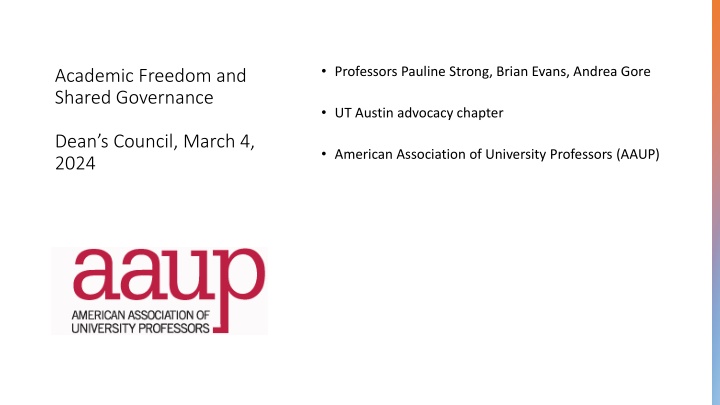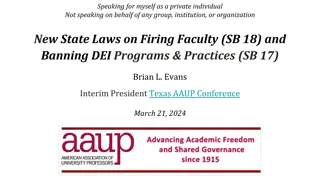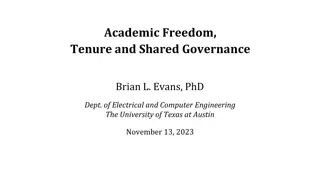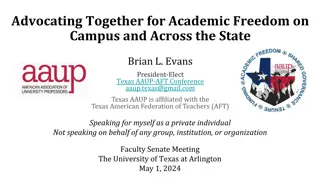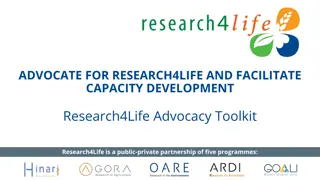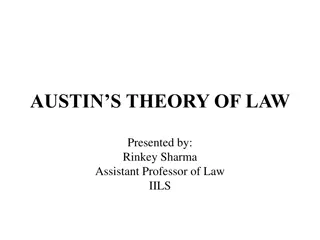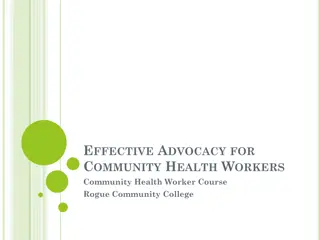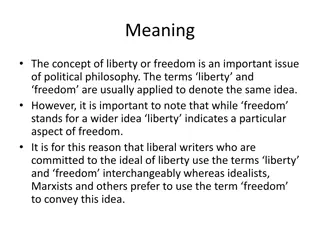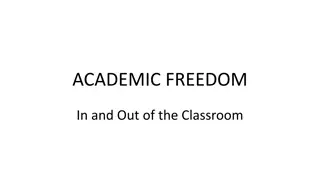Academic Freedom and Shared Governance Advocacy at UT Austin
Professors Pauline Strong, Brian Evans, and Andrea Gore lead the advocacy chapter at UT Austin, promoting academic freedom and shared governance. The American Association of University Professors (AAUP) plays a vital role in advancing these principles, supporting over 45,000 members. Principles of academic freedom, defined by the AAUP, emphasize free inquiry, disciplinary expertise, and self-regulation, safeguarded by measures like tenure and due process. The AAUP acts as a resource and advocate at national, state, and local levels, collaborating with various organizations to uphold academic freedom.
Download Presentation

Please find below an Image/Link to download the presentation.
The content on the website is provided AS IS for your information and personal use only. It may not be sold, licensed, or shared on other websites without obtaining consent from the author.If you encounter any issues during the download, it is possible that the publisher has removed the file from their server.
You are allowed to download the files provided on this website for personal or commercial use, subject to the condition that they are used lawfully. All files are the property of their respective owners.
The content on the website is provided AS IS for your information and personal use only. It may not be sold, licensed, or shared on other websites without obtaining consent from the author.
E N D
Presentation Transcript
Professors Pauline Strong, Brian Evans, Andrea Gore Academic Freedom and Shared Governance UT Austin advocacy chapter Dean s Council, March 4, 2024 American Association of University Professors (AAUP)
Overview AAUP as a national, state, and local organization (with links to resources) Four constituent elements of academic freedom Academic freedom and First-Amendment free speech Protections for academic freedom The roles of CCAFR and AAUP at UT Austin AAUP s legislative work AAUP as a resource Q&A AAUP officers speak for ourselves as individuals and not for our institution.
American Association of University Professors Advancing academic freedom and shared governance since 1915 45,000 members in unionized and advocacy chapters Affiliated with the American Federation of Teachers in 2022 (1.7M members; 148,000 faculty) Texas AAUP Conference Brian Evans (Engineering, UT Austin), President 24 chapters (including UT Austin, Texas A&M, Texas State, Texas Tech, U of Houston, UNT) Members at 75 institutions UT Austin advocacy chapter Relaunched in Fall 2021 by B. Evans and P. Somers Currently has more than 140 members Nonpartisan membership organization governed by elected Executive Committee Collaborate with multiple faculty, student, and citizen organizations on campus and off campus AAUP at the national, state, and local level
Principles of Academic Freedom Defined in 1915, 1925 and 1940 AAUP/AAC&U Statement of Principles on Academic Freedom & Tenure Jointly formulated by AAUP representing faculty and AAC&U representing college & university presidents Endorsed by more than 250 disciplinary associations Widely adopted including in UT Austin and UT System policies Based on the importance of free inquiry for the common good and the concepts of disciplinary expertise and self-regulation (including professional ethics) Applies to all teachers, including professional faculty and graduate teaching assistants (all those engaged in teaching who exercise professional judgment) (AAUP statement on contingent appointments, 2012) Safeguards include tenure, shared governance, and due process for those accused of violating University policies AAUP Resources for Advancing Academic Freedom
Four Constituent Elements of Academic Freedom and Responsibility 1. Freedom in the Classroom Freedom to discuss all material that is germane to the subject matter of a course Fosters viewpoint diversity: protects teachers in developing and disseminating new knowledge from all viewpoints, including conservative, moderate, liberal, and apolitical Gives teachers the full freedom to help students develop the critical thinking, knowledge, training, and professional networks needed for successful careers. Grounded in the teacher s disciplinary expertise, subject to professional codes of ethics Classroom defined as any location, real or virtual, in which instruction occurs ; Academic freedom protections apply in classrooms of all types (AF and Electronic Communications) 2. Freedom in Research Freedom to explore all avenues of scholarship, research, and creative expression and to publish the results of such work Subject to the adequate performance of other academic duties. Research for pecuniary return based on an understanding with the authorities of the institution.
Four Constituent Elements of Academic Freedom 3. Intramural Speech 4. Extramural Speech Freedom from institutional censorship or discipline Freedom from institutional censorship or discipline when speaking or writing as citizens when speaking or writing as participants in the Does not necessarily relate to disciplinary expertise governance of an education institution Teachers special position in the community imposes Applies whether or not faculty is a member of an special obligations: accuracy, restraint, respect for agency of institutional governance opinions of others, indication that they are not speaking for institution.
Academic Freedom and First-Amendment Free Speech The right to free speech is not a good model for understanding academic freedom because it is premised on an equality of status Academic freedom is a right based on professional expertise. Academic freedom applies to teachers at public and private institutions Freedom of speech under the First Amendment is extended to all faculty and students at public institutions subject to time, place, and manner restrictions regulation must be content-neutral (views must not be censored and balance must not be required) AAUP Resources on Campus Free Speech
Protections for Academic Freedom Tenure A means to an end: the protection of academic freedom in teaching and research. Shared Governance Meaningful faculty participation in institutional governance. Role of faculty is to have primary responsibility for curriculum, research, faculty status, those aspects of student life related to academic process. Faculty distinctively qualified to exercise decision-making authority in their areas of expertise. AAUP statement on faculty governance and academic freedom Due Process Following fair and consistent policies as constituted in institutional policies and procedures (HOP, etc.) Especially important for non-tenured faculty, who face significant risks when exercising academic freedom. AAUP Sanctions AAUP investigates, reports on, and may sanction institutions that violate academic freedom
AAUPs legislative work UT advocacy chapter re-established in the context of nationwide siege on academic institutions Model legislation introduced in multiple states National AAUP offers many resources on advancing academic freedom, shared governance, resisting political interference Texas AAUP worked with partners and legislators to remove teaching and research from SB 17 Concerns about transparency necessary for shared governance Concerns about possible academic freedom violations in implementation Texas AAUP worked to maintain a tenure system in SB 18 Concerns about campus-level implementation Texas AAUP will continue to oppose any version of SB 16, the anti-CRT bill, which would severely violate academic freedom AAUP officers and members with students and NGO representatives at the Texas State Capitol, after testifying as private citizens in opposition to SB 17
Collaborate with Faculty Council and Office of the Provost Offer regular workshops on academic freedom for faculty and students Participate each year in Free Speech Week activities Work to resolve faculty and graduate student concerns as they arise Sponsor monthly social hours to raise awareness of academic freedom issues Write op-eds and maintain active social media presence Plan to participate in faculty and graduate student orientations Are available to work with departments, schools, and colleges upon request AAUP as a campus resource
Thank you! Questions or Comments? American Association of University Professors
